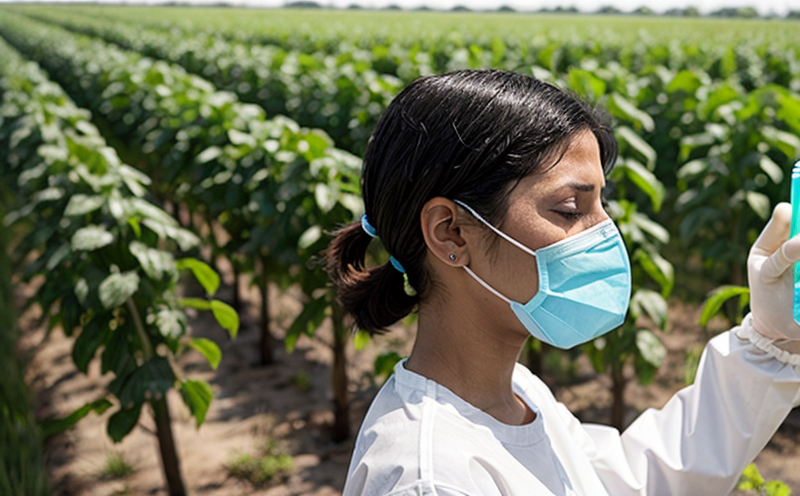EN 17803 POPs in Environmental Samples Test
The European standard EN 17803 specifies a comprehensive methodology to determine the presence and concentration of Persistent Organic Pollutants (POPs) in environmental samples. This service is crucial for ensuring compliance with international regulations aimed at reducing the release and exposure to POPs, which are substances that remain in the environment for long periods, pose risks to human health, and can accumulate up to a critical level.
POPs include chemicals like polychlorinated biphenyls (PCBs), dioxins, furans, and polybrominated diphenyl ethers (PBDEs). These contaminants are of particular concern because they can bioaccumulate in the food chain and have been linked to various health issues including cancer, reproductive disorders, endocrine disruption, and neurobehavioral effects.
The standard defines a series of steps that laboratories must follow to ensure accurate and reliable testing results. The process begins with sampling, where environmental samples such as water, soil, sediment, air, or biota are collected from sites suspected of contamination. Sample preparation is critical; this involves homogenization, extraction, concentration, and clean-up processes to isolate the target POPs for analysis.
The analytical techniques employed in EN 17803 include gas chromatography-mass spectrometry (GC-MS) and liquid chromatography-tandem mass spectrometry (LC-MS/MS). These methods provide high sensitivity, selectivity, and accuracy necessary to detect trace levels of POPs. The standard specifies the use of certified reference materials (CRMs) for calibration purposes and quality control.
The acceptance criteria in EN 17803 are stringent to ensure that only samples meeting defined thresholds are considered compliant with regulations such as those outlined by the Stockholm Convention on Persistent Organic Pollutants. Compliance is a primary focus, especially for industries involved in manufacturing, agriculture, and waste management.
The testing process involves not just the analysis but also meticulous documentation of all steps from sampling to final results. This ensures traceability and reliability, which are essential for regulatory compliance. The service provided by Eurolab includes comprehensive reporting that details each step taken during the test as well as the final results.
Understanding the context of environmental pollution is vital in interpreting these test results. POPs have been a global concern since their widespread use and release began several decades ago. As awareness grew, so did efforts to develop standards like EN 17803 to monitor and mitigate risks associated with these persistent contaminants.
Regulatory bodies around the world have adopted similar standards to ensure consistent methodologies across different jurisdictions. This global approach helps harmonize data collection and analysis, making it easier for countries to collaborate on environmental protection measures.
Scope and Methodology
The scope of the EN 17803 POPs test encompasses a wide range of environmental samples that could potentially contain POPs. These include:
- Water from surface water bodies, lakes, and rivers.
- Sediments found in aquatic environments.
- Air particulate matter collected at various locations.
- Biota such as fish and birds which can accumulate POPs through the food chain.
The methodology outlined in EN 17803 is designed to ensure that these samples are analyzed accurately. The process involves several key steps:
- Sampling: Environmental samples are collected from sites where contamination may be present.
- Preparation: Samples undergo homogenization, extraction, concentration, and clean-up processes to isolate the target POPs.
- Analysis: Analytical techniques such as GC-MS and LC-MS/MS are used for the detection of POPs.
- Reporting: Results are documented in a comprehensive report that includes all steps taken during testing.
The standard emphasizes the importance of using certified reference materials (CRMs) and quality control measures to ensure accuracy and reliability. This approach is critical for industries involved in manufacturing, agriculture, and waste management, which must comply with stringent regulations.
Industry Applications
- Agriculture: Monitoring pesticide residues and other POPs to ensure compliance with safety standards.
- Mining: Detecting and mitigating the release of hazardous chemicals into the environment.
- Manufacturing: Ensuring that production processes do not inadvertently release harmful substances into the environment.
- Sewage Treatment Plants: Analyzing effluents to ensure they meet stringent environmental standards before discharge.
The EN 17803 POPs test plays a vital role in these industries by providing reliable data that can inform decision-making processes aimed at minimizing environmental impact. The service offered by Eurolab ensures that this testing is done with the highest level of accuracy and precision.
Eurolab Advantages
Eurolab stands out in providing EN 17803 POPs tests for environmental samples due to several key advantages:
- Expertise and Experience: Our team of chemists, biologists, and engineers has extensive experience in environmental testing.
- State-of-the-Art Facilities: Equipped with advanced analytical instruments that comply with the latest international standards.
- Comprehensive Reporting: Detailed reports that provide a comprehensive overview of all steps taken during testing, ensuring traceability and reliability.
- Regulatory Compliance: Ensures that all tests are conducted in accordance with relevant regulations such as the Stockholm Convention on Persistent Organic Pollutants.
- Prompt Turnaround Times: Fast results to help our clients make timely decisions.
- Customized Solutions: Tailored testing plans that meet specific client needs and requirements.
By leveraging these advantages, Eurolab ensures that its clients receive the most accurate and reliable test results possible. This is particularly important for industries where compliance with environmental regulations is paramount.





